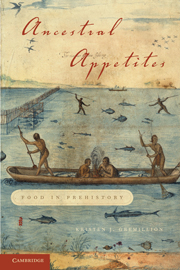1 - Ancestors
Published online by Cambridge University Press: 05 June 2012
Summary
The world, it has often been remarked, appears as if it had long been preparing for the advent of man: and this in one sense is strictly true, for he owes his birth to a long line of progenitors.
Darwin, The Descent of ManThe maintenance of life, through the constant acquisition of food, is the great burden imposed on existence in all species of animals.
Lewis H. Morgan, Ancient SocietyAll animals must eat. In this respect, at least, we are no different from other heterotrophs – we take in solar energy indirectly, by consuming other organisms. This way of life has characterized multicellular animals since their origins more than five million years ago. But heterotrophy is a broadly defined ecological category that gives no hint of the diversity of feeding methods and adaptations found among animals. That these adaptations – morphological, developmental, or behavioral – vary in regular ways between species, genera, families, and even higher taxonomic groups is today a noncontroversial assumption among evolutionary biologists. Still fiercely debated, however, is the hereditary basis of feeding strategies: Which behaviors and preferences are more or less fixed by genetic inheritance and which are free to vary in response to the individual's environment?
- Type
- Chapter
- Information
- Ancestral AppetitesFood in Prehistory, pp. 5 - 11Publisher: Cambridge University PressPrint publication year: 2011

